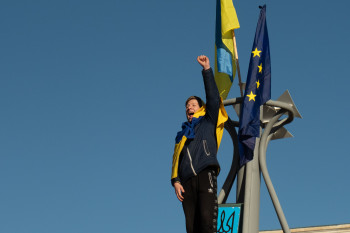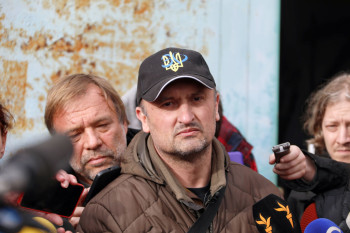How volunteers helped Kherson residents survive through the occupation

KHERSON – When Russia captured Kherson in March, disrupting supply chains to the city, local Ukrainian volunteers kept it running.
When people had no food, they set up free hot meal cafeterias. When people had no medicine or hygiene goods, they brought them in from Odesa. When children needed to take their minds off the subjugation, they set up a sports center in a local school.
"Every day, we served about 400 meals," said Iryna Derevyanko, the head of a regional sports labor union living in Kherson. "We didn't get much help from the Ukrainian government except the use of School 23."
According to volunteers, representatives of the local Ukrainian government were still in the city up until approximately six weeks into the occupation, but weren’t of much help to them.
“It was all held together by friends, neighbors and social media,” Derevyanko said.
“They’re the only ones who saved us,” Svitlana Polivnyak, a local resident who’s been benefiting from the volunteers’ aid since the early days, said in front of School 23, as she waited to receive some goods, in the now-liberated Kherson.

“I came here many times during occupation because they cooked meals. Two months ago, I asked for clothes and they gave them to me.”
The Russian forces harassed the volunteers along the way.
"There were searches, some people were taken, they turned over my entire house," said Derevyanko. "Their cars stood down the street, watching us, thinking that we were feeding insurgents."
Today, Kherson teems with volunteers. In the first two weeks after liberation, Freedom Square was full of trucks and pavilions from multiple international groups, including the Red Cross and World Central Kitchen, handing out everything from food to diapers.
During the eight months of occupation, such organizations were fewer and more localized, so Khersonians relied on local volunteer groups and on each other. Many helped their friends and neighbors with what they could.
“Every other person was a volunteer,” said Roman Baklazhov, a former city councilman and district representative.
One of the few organized volunteer groups was the initiative by Derevyanko and Baklazhov, with help from friends in Odesa, the south’s largest city, just hours away from Kherson by car.
“In the beginning, in March, there was no food,” said Baklazhov. “I have a friend — he’s fighting now — he used to be a farmer. He had lots of potatoes that were just starting to go a little bad and it would be impossible to sell them.”
After speaking with Derevyanko, Baklazhov rang his friend up and said: since the spuds were still perfectly edible, why not distribute them for free?
“So he gave me 100 tons of potatoes and we started handing them out — me and Iryna (Derevyanko),” Baklazhov recalls. “Later, when people started opening up feeding points, the whole city began taking potatoes from us.”
Over on her side of the city, in a rustic small house, Derevyanko was ready.
"When the war started, we gathered at this dacha because it had a basement and it was safer to be here," she said. "When the food shortages arose, people didn't know what to do... no one expected this kind of war in the 21st century.”
After trying to deliver potatoes to people, they quickly realized how inefficient that was and decided instead to cook hot meals and serve them at the dacha and, soon, the cafeteria of School 23 just nearby. At the dacha, they often cooked over a wood-fired stove, which they continue to do to this day — Kherson’s electricity system was destroyed by the Russians as they were pushed out from the city in November.
Local supermarket businesses plugged into the support network as well, providing a variety of foods for the volunteers to cook.
“The food was tasty,” said Polivnyak. “They had porridges, borsches, soups, roasted meat, everything.”
The initiative revolved around a core group of about 20 people, plus whoever wanted to volunteer their time, Baklazhov said. Helpers also benefitted — for example, people who helped pluck and clean chickens, got to take a fraction of the birds home for themselves.
Supply chains later improved but many people still struggled. They became unemployed, either quitting their jobs to avoid working for Russians or losing their place of work entirely.
And it wasn’t just the food that saw shortages. The occupation led to a critical lack of important medicines, expendable personal products and many other goods.
Interviews with dozens of Khersonians and a look at Kherson’s many broken storefronts reveal that the Russians went on an epic looting spree, taking anything they thought was even remotely valuable.
Upon hearing that the occupied Kherson was short of necessities such as food or medications, residents of Odesa also sprang into action. Andrei Vakarchuk, a sailor who returned home on the eve of the invasion, began buying medications with his friends and sending a van packed with them to Kherson several times per week.
His group, with a core of about five people, is still doing this. On Nov. 24, he got to make their first aid delivery in person.
“It was just us calling each other, friends helping out friends,” said Vakarchuk. Baklazhov, whom he met over the phone, helped deliver and distribute them. Derevyanko had sign-up sheets for people to put down their medicinal requests.
“All types were in demand, from citramon (aspirin, acetaminophen and caffeine) to very complicated preparations,” said Vakarchuk.
People especially needed meds for chronic conditions such as heart problems and high blood pressure. Some were delivered directly to hospitals. He said few people wanted Russian meds, because they were of poor quality or mistrusted for being Russian.
Getting these vans full of food, drugs and personal goods through Russian checkpoints was fraught with its own challenges. The Russians liked to rifle through the pile and pick things off the top, if they allowed the shipments to go through at all.
“We would reach agreements, put vodka on top for the Russians to take; learned to bury some things so they wouldn’t take them,” said Vakarchuk.
Getting past the Russians became increasingly difficult as the summer months went on.
Residents of Kherson told the Kyiv Independent that when the invaders took the city, they felt confident and in-charge.

As the sabotage, assassinations and precision missile attacks, clearly targeted by locals, began to pile up, the Russians’ paranoia climbed. Fearing that every hand was turned against them, they went after activists and volunteers.
Baklazhov said that things got especially hard after the Russian troops captured a locomotive technician in Kakhovka, a town north of Kherson, and forced him to confess that he was sabotaging, not fixing a train.
“After that, they started to grab all the volunteers,” Baklazhov said.
Volunteers usually spent between a few days and a few weeks in Russian confinement before being released. Baklazhov said they were rarely beaten but it became harder for them to work.
Baklazhov himself was confined for more than two months and was tortured with electricity, but he believes it was because of his nationalist activism from years ago, not his volunteer work in 2022.
“It became more difficult to drive in,” said Vakarchuk. “They saw a threat even in children’s aid. Our last delivery tried to go through in September, right before their so-called referendum.”

Derevyanko said her property saw multiple searches, one by 20 armed men, and there was usually someone watching them from a distance. Some volunteers were arrested. Phones were searched for pro-Ukrainian content. Derevyanka was told to stop writing 'good morning Ukrainian Kherson' in her union's social media updates, to avoid provoking the Russians.
Nevertheless, her group and others like it worked all through the occupation and continue to work today. She hopes she’ll be granted full use of the school to turn it into a more permanent youth sports center for the kids — the way it was used over the summer.
The kids were also mobilized to deliver aid to elderly and disabled people who couldn’t come get it themselves.
Right now, the school still serves as an aid distribution center, crowds of people waiting to receive meals, drugs, hygiene products and warm winter clothes on specific days. Some are there for the first time, others have been receiving this aid from the very beginning.
“They helped me a lot,” Polivnyak said.
____________________
Note from the author:
Hi, this is Igor Kossov, I hope you enjoyed reading our article.
I consider it a privilege to keep you informed about one of this century's greatest tragedies, Russia's ongoing invasion of Ukraine. With the help of my colleagues, I will continue to bring you in-depth insights into Ukraine's war effort, its international impacts, and the economic, social, and human cost of this war. But I cannot do it without your help. To support independent Ukrainian journalists, please consider becoming our patron. Thank you very much.












